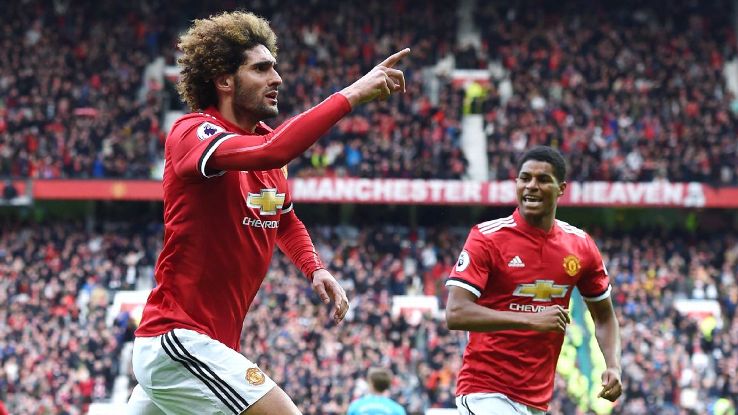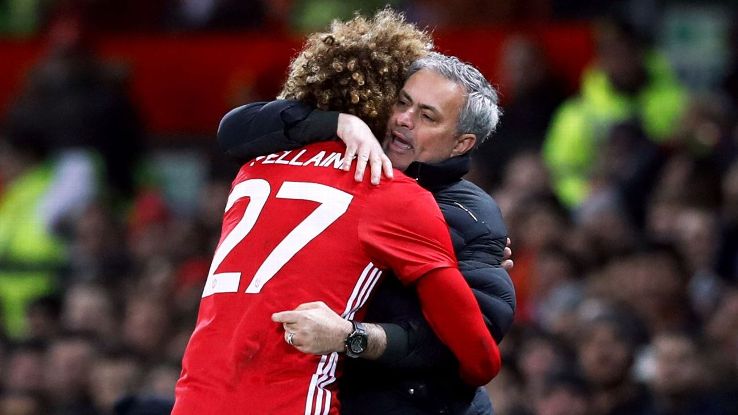






No player divides opinion quite like Marouane Fellaini at Manchester United.
To many, he is a symbol of the club’s decline in the post-Sir Alex Ferguson era — a player who embodies United’s limitations and one who would not even be considered for Old Trafford had the Scot still be in charge.
For others, however, he is an example of perseverance, dedication, character and, certainly from Jose Mourinho’s perspective, a player who offers unique qualities that give United a crucial Plan B when the chips are down.
Fellaini’s stoppage time winner against Arsenal on Sunday was an example of Plan B being executed to perfection — a long ball, won by the towering Belgian, which found its way into the net off the back of Fellaini’s head.
It wasn’t pretty, but it was effective — a summation which could pretty well describe Fellaini’s career.
His winner against Arsenal brought Fellaini’s Old Trafford future back into sharp focus, however, with the 30-year-old out of contract at the end of the season.
Roma, Marseille and wealthy clubs in the Chinese Super League are keen to sign the £27.5m buy from Everton as a free agent this summer, but Mourinho also wants him to stay at United.
Fellaini has so far rejected the terms on offer remain at the club, but Mourinho remains hopeful the midfielder will commit to a further two years at Old Trafford.
But the question over what Fellaini does next quickly comes back to the debate over what he actually brings to United.
Perhaps both sides of the debate are right. Fellaini does embody where United are right now, but he is also an effective option for Mourinho to turn to when required.
Having endured a nightmare start to his United career under David Moyes, when he became the target of frustration from the supporters, who cruelly nicknamed him the “Lampshade” because of his appearance and lack of movement, Fellaini has fought back to carve out a good career at the club and earn respect on and off the pitch.

He has secured winners’ medals in the FA Cup, EFL Cup and Europa League and made more appearances for United than the likes of Dwight Yorke, Teddy Sheringham, Dimitar Berbatov and Robin van Persie.
When he goes, he may not be remembered fondly by everyone, but he will leave having made his mark.
But in the cold light of day, for United to become what they want to be again, Fellaini has to be consigned to the past.
Plan B worked on Sunday against Arsenal, when Fellaini was preferred as a substitute to the more creative Juan Mata, but the reality is that it doesn’t work that often.
Fellaini can be a game-changer, but he can also get United stuck in the mud, especially against top-quality opposition.
This season, he has scored just four Premier League goals, but there have been no assists, despite his aerial prowess and ability to knock the ball down for his teammates.
According to official Premier League statistics, Fellaini has not even created a goalscoring chance this season. He has delivered just three crosses, with a 0 percent accuracy rate, and has produced no through balls.
How about the defensive side of Fellaini’s game? Well, again using Premier League data, he has made 15 tackles, with a 53 per cent success rate.
He has won four 50-50 battles and, when it comes to aerial duels he has won 33 and lost 21, so he is perhaps not the unique game-changer that Mourinho believes him to be.
Arsenal aside, his goals this season have come against Crystal Palace, Basel and Leicester City — last season was a similar tale of strikes against lesser lights Middlesbrough, Wigan and Hull, with one crucial effort coming against Celta Vigo.
If Fellaini is a game-changer, he does not change too many of the big ones, which is why Mourinho and United should now accept that the time has come for a parting of the ways.
Fellaini has made a valuable contribution at United, but while he remains at the club, will they truly be a challenger for the major honours?
As it stands, his presence gives Mourinho the easy option to go long and resist a more creative approach.

Clubs who win the biggest prizes rely on skill, craft and flair to break down stubborn opponents, rather than a player like Fellaini, because creating gaps in the final third is a much more reliable way to score than launching the ball on to a big midfielder’s head and hoping for the best.
Manchester City, Real Madrid, Barcelona, Bayern Munich and Liverpool all back pace, flair and creativity over long ball football and they are the teams winning, or fighting it out for, the biggest trophies.
United, with Fellaini in the team, could not even overcome a limited Sevilla in the Champions League round of 16.
Without Fellaini, Mourinho would have to find another way, a better way, to unlock opponents’ doors, but does he want to do that?
Or is he happier to fall back on Plan B, regardless of its unconvincing success rate?
But for United to progress and become a serious contender again, they need to learn how to live without Fellaini.
Mark Ogden is a senior football writer for ESPN FC. Follow him @MarkOgden_

Be the first to comment